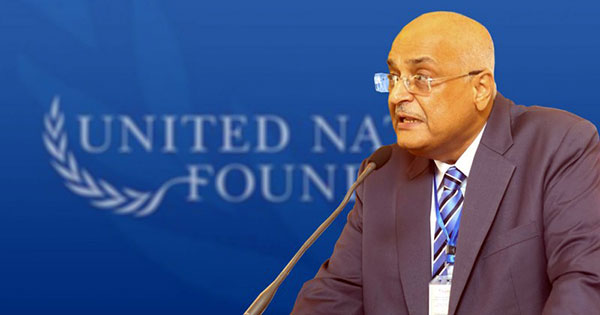United Nations Foundation, New York, New York
On September 22, 2015, Southern Voice and the United Nations Foundation hosted a small informal brainstorm on follow‑up and review for the SDGs, with remarks from Dr Debapriya Bhattacharya, Distinguished Fellow at the Centre for Policy Dialogue (CPD) – Bangladesh, and Chair of LDC IV Monitor and Southern Voice; Dr Sakiko Fukuda-Parr, Professor of International Affairs at The New School; and Navid Hanif, Director, Office for ECOSOC Support and Coordination, UN Department of Economic and Social Affairs.
The conversation brought together experts from academia, think tanks, the UN system and Missions to discuss the legacy of the MDGs’ monitoring mechanism, how to ensure multi-stakeholder engagement in SDG follow up and review, and the potential role of southern think tanks.
The discussion was held under the Chatham House Rule. View the concept note and discussion questions. This report provides key takeaways from the discussion.
The MDGs’ monitoring mechanism – what did we learn? What is and should be different under the new 2030 Agenda?
The MDGs were a learning process for all stakeholders, including governments, the UN system and thinktanks. There are many important lessons to apply to the new 2030 agenda, including that:
- The annual MDGs reports focused on developing countries, and were done at the national level with support from the UN system. The new 2030 Agenda is universal, and universality must translate to follow-up and review by including a focus on the global North and the global partnership.
- The MDGs and their targets were absolute, and did not take account of differing starting points across countries. The SDGs are an opportunity to develop a monitoring metric that takes into account different baselines and pace of progress – this will give us a better measure of performance.
- The SDGs also provide an opportunity to better engage regional actors. For example, the Economic Commission for Europe, the OECD, and the African Peer Review Mechanism can feed into the global processes.
- The HLPF has a broad and authoritative mandate to conduct global-level reviews. However, it will be difficult to monitor every goal each year. Given goal 17’s centrality to the framework, should it be reviewed more frequently or intensively, such as at each year or every fourth year at the Head of State and Government level? Other “cross-cutting” issues for more frequent or intensive review could include goals 5, 10 and 16. The Secretary-General’s report on follow-up and review, expected early 2016, should help with some of these questions.
- Conversely, some voiced concern about “cherry-picking” priority issues. It will be important to think about integration, prioritization and sequencing of the SDGs.
- How do we build on existing international reporting structures, such as the Human Rights Council Universal Periodic Review? How do you integrate the Addis Ababa Action Agenda and the SDGs at the country level?
What role should civil society, and particularly Southern Think Tanks play in follow-up and review?
- Accountability is more than tools and architecture – you also need political pressure from a coalition of actors, including CSOs. It will be important to connect several threads, such as: (1) building ownership and public resonance with the SDGs; (2) helping civil society “rediscover” its role of challenging power (while balancing the need for CSOs to partner with governments for delivery); (3) supporting a “people’s audit” or “shadow report” and other innovative ways of making states accountable; and (4) tying the SDG narrative to the “global narrative of anger” (see below).
- Civil society organizations (CSOs) will be crucial actors in internalizing and implementing the new 2030 Agenda – there are already a number of bottom-up initiatives taking place in the developed world, with CSOs applying the SDG framework to their domestic activities.
- Recently, CSOs are increasingly mobilized around a “global narrative of anger” on issues including the financial crisis, climate change, inequality and conflict. We have an opportunity to harness this energy, and use their comparative advantages to strengthen the non-governmental part of the review mechanism.
- Southern thank tanks have the intellectual capital to do serious policy analysis, and should focus on goal 17, the global partnership, and holding donors to account. They are the bridge between advocacy organizations and policy-makers, and the best repository of expertise and knowledge at the national level.
- Goal 16 demonstrates the universal importance of democratic consultations, and of parallel and shadow reporting by CSOs. This reporting should be parallel but complementary, and credible. How can CSOs remain independent from the formal process but remain relevant?
- Southern think tanks should continue to engage in and infuse New York and Washington DC conversations with their learnings.
- They are critical actors in mobilizing a joint community based in evidence, credibility and political strategy. South-south cooperation will become increasingly important for building the capacity to implement and report on the agenda. Southern think tanks can provide ideas on how to use south‑south networks to support implementation and follow-up and review, and then draw in the political community to progress important issue such as equity and justice.



